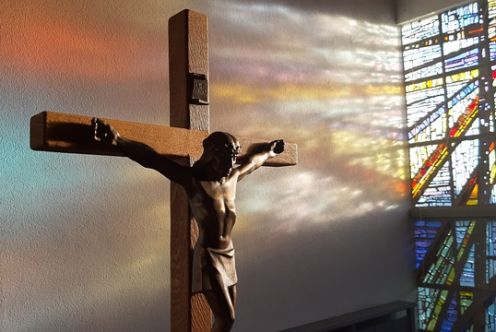Today we are catching up on a few reflections by one of our favorite retreat presenters and spiritual directors, Fr. Michael Schleupner. He continues his series about cultivating our image of God. Let’s learn more from Fr. Michael’s insights below.
Our Image of God – 5
Dear Friends,
In the last “Our Image of God” blog, I shared a more recent understanding of Original Sin and the Sacrament of Baptism. This understanding does not leave us human beings feeling tainted, much less corrupt. It does not leave us feeling unworthy and separated from God. Instead, it leaves us feeling human and imperfect, sometimes sinful, but at the same time esteemed and even loved by God. It assures us of God’s presence in us as God’s creatures. Today I am continuing to build this image of God which is so vital for our faith and our life itself.
Traditionally, we have seen God as distant and, as said above, separated from us by Original Sin and by our individual personal sins. Our thinking has been that our connection or relationship with God was and is only restored through the saving work of Jesus.
I now see Jesus as revealing a God – his Father – who has been and always is with us. God is, to use Jesus’ word, our Father, our heavenly parent who always embraces us with his love. So, “Jesus did not restore a lost relationship with God but revealed and gave us the ability to see and experience the Divine Love that was and is always available to us.” I resonate with this understanding of Jesus and God. It just seems to connect with our human experience.
We believe that Jesus reveals himself to us as the full revelation of the Father. He is the Word made flesh, the Son. With this in mind, we are to accept him as our Savior if we are to be his followers or disciples.
I also like to see it this way. Jesus reveals who God is and what God is like. In seeing and knowing Jesus, we know God and what God is like. Jesus calls into a loving relationship with God who is love itself. By doing this, Jesus also reveals who we are – our true self, “as always and forever beloved” of God. And so, in Jesus we can discover and become our true selves as persons. What a positive way this is for looking upon our spiritual life and earthly journey!
~Father Michael Schleupner
The above quotations and inspiration for some of the above are from The Transformed Heart by Tom Zanzig.
Our Image of God – 6
Dear Friends,
In the reflection above, I began expressing an image of God that is grounded in an understanding of ourselves as human and imperfect, sometimes sinful, but at the same time esteemed and even loved by God. This reflection continues to build this image of God which is so vital for our faith and our life itself.
Traditionally, we have seen ourselves as saved by God through the blood of Jesus shed on the cross. We have sometimes used the word “ransom” to express this – meaning that Jesus had to ransom us from the devil by dying on the cross. We have also said that the Father sent Jesus to do this in reparation for human sinfulness. Jesus, in effect, took the place of or stood in for all of humanity by suffering and dying for our sins.
From my reading of some recent Catholic authors, I wonder if we could also look at it this way. Would an almighty and all-loving God have to require the death of his Son for the salvation of humanity? Is it possible that “Jesus didn’t need to embrace the cross to pay back a God whose love was limited. Rather, Jesus died to convince us that God’s love has no limits.” So, Jesus lived his life and fulfilled his mission in this world so perfectly and so authentically that opposition was bound to arise. His suffering and death were the outcome of a life of love and the fullest and most complete expression of his or God’s love for us.
In our tradition, we have sometimes looked upon life on this earth as a “valley of tears” and as an “exile” from God or our heavenly home. There are Catholic prayers that use these words. Human life is then seen as a testing ground. We are to earn our salvation by how we live in this “valley of tears.”
Might we also remember Jesus’ hope for us: “I have said these things to you so that my joy may be in you, and your joy may be complete” (John 15:10)? Jesus speaks of his joy becoming ours in the present, and not just in the future. So, might it be a question of our accepting the presence, love, and joy of God that is already with us? Might it be a question of accepting what God has already given us rather than our trying to earn or merit it in a
~Father Michael Schleupner
The above quotation is from The Transformed Heart by Tom Zanzig. Inspiration for some of the above is from the book just named and from Good Goats-Healing Our Image of God by Dennis Linn, Sheila Fabricant Linn and Matthew Linn.
